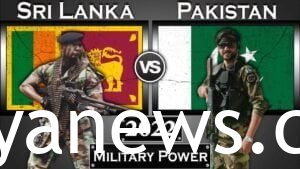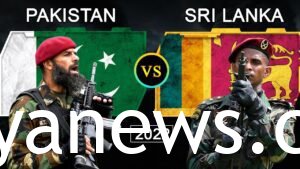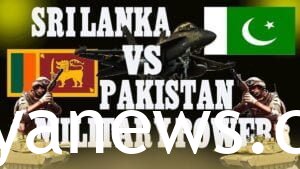Sri Lanka vs Pakistan: The geopolitical landscape of South Asia is marked by nations that have historically played significant roles in the region’s affairs. Among them, Sri Lanka and Pakistan stand out as countries with unique histories and diverse cultures. While both nations have faced their share of challenges, their military prowess is a critical aspect that often comes under scrutiny. In this article, we will delve into a comparative analysis of the military capabilities of Sri Lanka and Pakistan to determine which one holds the upper hand.

Sri Lanka’s Military Strength:
Sri Lanka, a relatively small island nation in the Indian Ocean, has faced internal conflicts, particularly the prolonged civil war against the Liberation Tigers of Tamil Eelam (LTTE), which officially ended in 2009. The Sri Lankan military showcased its resilience and strength during this conflict, employing a combination of ground forces, navy, and air force to achieve victory.
The Sri Lankan Army, boasting a considerable number of well-trained personnel, demonstrated its ability to adapt to various terrains during the conflict. The Navy played a crucial role in securing the island’s maritime borders, while the Air Force provided aerial support, showcasing a coordinated and multifaceted approach.
However, it’s important to note that Sri Lanka’s military focus has largely been on internal security and counterinsurgency operations. This specialization may limit its capabilities in facing external threats or engaging in large-scale conventional warfare.
Pakistan’s Military Might:
On the other hand, Pakistan, a nuclear-armed nation with a larger landmass and population compared to Sri Lanka, has a military with a long history of involvement in regional conflicts. Pakistan’s military capabilities have been shaped by its complex relationship with neighboring India, resulting in a strong emphasis on conventional warfare capabilities.
The Pakistan Army, one of the largest in the world, is equipped with modern weaponry and has undergone extensive training for conventional warfare. The country’s strategic location, sharing borders with India, Afghanistan, and Iran, has further influenced its military doctrine, emphasizing a robust defense posture.
Pakistan’s Air Force and Navy have also undergone modernization efforts, acquiring advanced fighter jets and naval vessels. The possession of nuclear weapons adds another layer to Pakistan’s military strength, acting as a deterrent against potential adversaries.
Comparative Analysis:
When comparing Sri Lanka and Pakistan in terms of military prowess, several factors come into play. Sri Lanka has shown exceptional capabilities in handling internal conflicts and maintaining internal security. Its military is well-adapted to asymmetrical warfare and counterinsurgency operations.

On the other hand, Pakistan’s military is geared towards conventional warfare, with a focus on defending its borders against external threats. The possession of nuclear weapons adds a significant element of deterrence, contributing to regional stability.
In a hypothetical scenario of direct military confrontation between Sri Lanka and Pakistan, the outcome would largely depend on the nature of the conflict. If it involves asymmetrical warfare or counterinsurgency operations, Sri Lanka’s experience and expertise would provide an advantage. However, in a conventional conflict, Pakistan’s larger and more technologically advanced military might tip the scales in its favor.
Conclusion:

In conclusion, determining the more powerful military between Sri Lanka and Pakistan is a nuanced task. Both nations have distinct strengths shaped by their unique geopolitical circumstances and historical experiences. While Sri Lanka excels in counterinsurgency operations, Pakistan’s military might is geared towards conventional warfare, backed by its nuclear capabilities. Ultimately, the assessment of military prowess must consider the specific context and nature of potential conflicts.
WRITTEN BY ALEX

